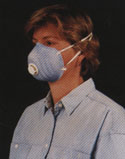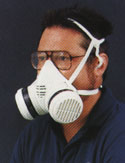Inflammation
of the bronchial tubes of the lung, leading to cough productive
of phlegm. In order for this to be considered chronic bronchitis,
it must be present for at least several months of the year.
This is more common in farmers than persons who do not work
on a farm. In the population as a whole, smoking is the main
risk factor for this disorder.
Inflammation
of the bronchial tubes that lasts for several days or weeks.
This causes cough and mild chest tightness in some people. Heavy
exposure to grain dust is one thing that causes this condition.
This
syndrome consists of fever, chills and a flu-like feeling which
begins 4-6 hours after heavy exposure to organic dust. The most
common causes include breathing large amounts of grain dust
or being exposed to mold spores when uncapping a silo. Wearing
a dust mask helps prevent this.
This
is an allergic reaction in the lung to spores from molds, to
some bacteria that grow in spoiled hay or to poultry feathers
(rarely). Symptoms include a fever, dry cough and severe fatigue
which begin 4-6 hours after the exposure. This problem is uncommon
but can cause severe disability if not recognized and treated.
Spasm
and inflammation of the bronchial tubes cause cough, wheezing,
chest tightness and shortness of breath in asthma. A variety
of exposures to dust and fumes can worsen asthma in farmers.
Wearing a dust mask and regular use of medications can help
prevent symptoms.
These
problems are caused by gases such as ammonia (found in animal
confinement units) as well as by grain dust. They can be made
less severe by good ventilation and use of respiratory protective
devices. Some people with nasal and eye symptoms have allergies.
They should discuss possible use of medication for the allergy
with their physician.
- Make
sure all workers have access to masks when needed.
- Discard
disposable masks when they become soiled on the inside or
become clogged.
- Disposable
masks should have two straps for better fit.
- Disposable
masks worn in dusty environments should be NIOSH approved
for use in dusts and mists.
- Look
for these kinds of respiratory protective devices in your
local farm supply store and supply catalogs.
 |
 |
 |
| Two
strap mask with exhalation valve |
Half-face
mask with replaceable cartridge |
Powered
air purifying respirator |
This document
was produced by the Nebraska Rural Health and Safety Coalition.
Funded in part by a grant from the W.K. Kellogg Foundation.
Nebraska
Rural Health and Safety Coalition, University of Nebraska Medical
Center, 600 South 42nd Street, Omaha, Nebraska 68198-5300. Phone:
(402) 559-7397. FAX: (402) 559-8210.
Disclaimer and Reproduction Information: Information in
NASD does not represent NIOSH policy. Information included in
NASD appears by permission of the author and/or copyright holder.
More


